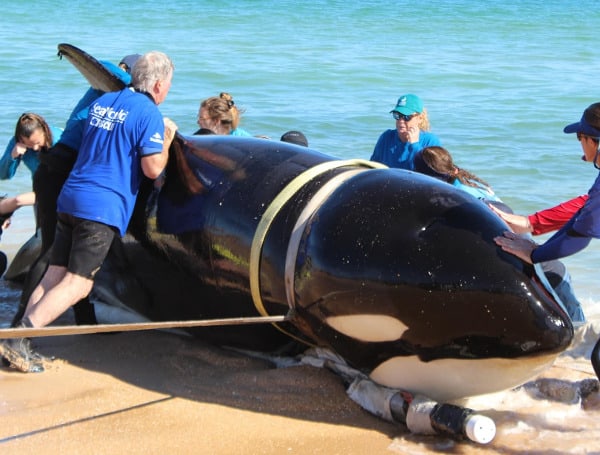
On Wednesday morning, the Flagler County Sheriff’s Office reported an orca at least 21-foot-long had washed up on the shore of Florida’s Palm Coast.
Deputies kept the crowd of onlookers back and closed access roads as marine biologists from SeaWorld and officials from the Florida Fish and Wildlife Conservation Commission worked to evaluate the whale and remove it
“This is the first killer whale stranding in the Southeast US, so there’s a lot of interest, obviously, in trying to sample it extensively and try to determine why it might have been sick and why it stranded,” Erin Fougeres, the Marine Mammal Stranding Program administrator for the National Oceanic and Atmospheric Administration’s Southeast Region said.
In the news: FWC’s Catch A Florida Memory Giving Away $2,000 Fully Outfitted Fishing Kayak
Fougeres said the killer whale, or orca, was reported by a member of the public at around first light on Wednesday morning.
The Flagler County Sheriff’s Office posted photos and video of the orca on social media and urged people to avoid the area until it is removed.
Fougeres said they are transporting the animal to a lab for a necropsy and it could take weeks or even months to determine why it stranded itself.
“We have veterinarians and very skilled biologists and pathologists who will be on scene to conduct the necropsy of the animal,” she said. “They’ll open up the whale and they’ll go through every organ system and look to observe if there’s any gross lesions, anything obviously wrong with the different organ systems, and they’ll take extensive samples from the whale, which will then send out to a lab, or multiple labs actually for analysis.”
Fougeres said that killer whales do work their way down to US waters in the southeast, but “it’s fairly uncommon.”
According to NOAA, killer whales are more abundant in colder waters like Antarctica, Norway, and Alaska but can also be found in tropical and subtropical waters.
“Our thanks to SeaWorld and MyFWC Florida Fish and Wildlife for their help in removing a 21-foot orca whale from the beach near Jungle Hut Park in Palm Coast. A necropsy will be done to determine the cause of death,” said Flagler County Sheriff’s Office.
Support journalism by clicking here to our GoFundMe or sign up for our free newsletter by clicking here
Android Users, Click Here To Download The Free Press App And Never Miss A Story. Follow Us On Facebook Here Or Twitter Here.

